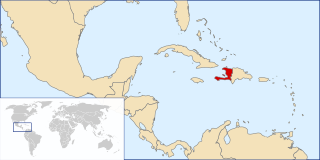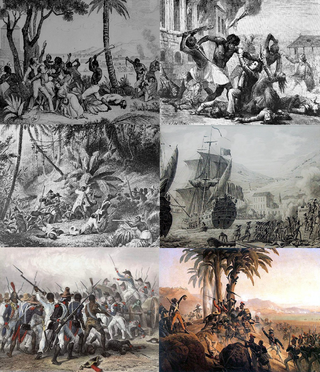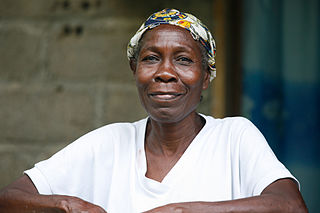Related Research Articles

The Dominican Republic is a country located on the island of Hispaniola in the Greater Antilles archipelago of the Caribbean region. It occupies the eastern five-eighths of the island, which it shares with Haiti, making Hispaniola one of only two Caribbean islands, along with Saint Martin, that is shared by two sovereign states. The Dominican Republic is the second-largest nation in the Antilles by area at 48,671 square kilometers (18,792 sq mi), and third-largest by population, with approximately 10.7 million people, down from 10.8 million in 2020, of whom approximately 3.3 million live in the metropolitan area of Santo Domingo, the capital city. The official language of the country is Spanish.

Haiti, officially the Republic of Haiti, and formerly known as Hayti, is a country located on the island of Hispaniola in the Greater Antilles archipelago of the Caribbean Sea, east of Cuba and Jamaica, and south of The Bahamas and the Turks and Caicos Islands. It occupies the western three-eighths of the island which it shares with the Dominican Republic. To its south-west lies the small Navassa Island, which is claimed by Haiti but is disputed as a United States territory under federal administration. Haiti is 27,750 km2 (10,714 sq mi) in size, the third largest country in the Caribbean by area, and has an estimated population of 11.4 million, making it the most populous country in the Caribbean. The capital is Port-au-Prince.

Hispaniola is an island in the Caribbean that is part of the Greater Antilles. Hispaniola is the most populous island in the West Indies, and the region's second largest in area, after the island of Cuba.

"La Dessalinienne" is the national anthem of Haiti. It was written by Justin Lhérisson and composed by Nicolas Geffrard.

Haitian Creole, commonly referred to as simply Creole, or Kreyòl in the Creole language, is a French-based creole language spoken by 10–12 million people worldwide, and is one of the two official languages of Haiti, where it is the native language of a majority of the population.

The United States occupation of Haiti began on July 28, 1915, when 330 U.S. Marines landed at Port-au-Prince, Haiti, after the National City Bank of New York convinced the President of the United States, Woodrow Wilson, to take control of Haiti's political and financial interests. The invasion and subsequent occupation was promoted by growing American business interests in Haiti, especially the National City Bank of New York, which had withheld funds from Haiti and paid rebels to destabilize the nation through the Bank of the Republic of Haiti with an aim at inducing American intervention.

The Haitian Revolution was a successful insurrection by self-liberated slaves against French colonial rule in Saint-Domingue, now the sovereign state of Haiti. The revolt began on 22 August 1791, and ended in 1804 with the former colony's independence. It involved black, biracial, French, Spanish, British, and Polish participants—with the ex-slave Toussaint Louverture emerging as Haiti's most prominent general. The revolution was the only slave uprising that led to the founding of a state which was both free from slavery and ruled by non-whites and former captives. It is now widely seen as a defining moment in the history of the Atlantic World.

The Haiti national football team represents Haiti in international football. Haiti is administered by the Fédération Haïtienne de Football (FHF), the governing body for football in Haiti. They have been a member of FIFA since 1934, a member of CONCACAF since 1961 and a member of the Caribbean Football Union (CFU) since 1978. Haiti's home ground is Stade Sylvio Cator in Port-au-Prince and the team's manager is Jean-Jacques Pierre.
The livre was the currency of Haiti until 1813. The Haitian livre was a French colonial currency, distinguished by the use, in part, of Spanish coins. It was equal to the French livre and was subdivided into 20 sous, each of 12 deniers. The escalin of 15 sous was also used as a denomination, since it was equal to the Spanish colonial real. Coins specifically for use in Haiti were issued between 1802 and 1809, along with various overstamped coins.

The Haitian Football Federation (FHF) is the governing body for football in Haiti. The FHF is responsible for overseeing all aspects of the game of football in Haiti, both professional and amateur. A member of CONCACAF since 1961, FHF is in charge of football in Haiti and all lower categories. The principal sporting field is the Sylvio Cator stadium in Port-au-Prince. It is a founding member of CONCACAF.

The Haitian passport is issued to citizens of Haiti for international travel.
Clairin is a distilled alcoholic spirit made from sugarcane produced in Haiti, that undergoes the same distillation process as rhum.

SS Haiti Victory (T-AGM-238) was originally built and operated as Greenville class cargo Victory ship which operated as a cargo carrier in both the Atlantic Ocean and the Pacific Ocean during World War II.
Guede L'Orage is a lwa in the Haitian Vodou religion. This spirit usually only manifests during storms.

The Igbo, whose traditional territory is called the Bight of Biafra, became one of the principal ethnic groups to be enslaved during the Atlantic slave trade. An estimated 14.6% of all slaves were taken from the Bight of Biafra between 1650 and 1900. The Bight’s major slave trading ports were located in Bonny and Calabar. The majority of Igbo slaves were kidnapped during village raids. The journey for Igbo slaves often began in the ancient Cave Temple that was located in Arochukwu Kingdom. During this period, the three Igbo Kingdoms followed the same culture and religion, yet tended to operate very differently from each other. The Kingdom of Nri and the Independent Igbo States did not practice slavery, and slaves from neighbouring lands would often flee to these kingdoms in order to be set free. Arochukwu, on the other hand, practiced a system of indentured servitude that was remarkably different from chattel slavery in the Americas. Eventually, with Europeans beginning to encroach on Igbo territory, causing the kingdoms to desire weaponry to defend themselves. In order to obtain European goods and weaponry, Arochukwu began to raid villages of the other Igbo kingdoms - primarily those located in the Igbo hinterlands. People would be captured, regardless of gender, social status, or age. Slaves could have been originally farmers, nobility, or even people who had committed petty crimes. These captured slaves would be taken and sold to European slave traders on the coast. Another way people were enslaved was through the divine oracle who resided in the Cave Temple complex. All Igbos practiced divination called Afa, but the Kingdom of Arochukwu was different because it was headed by a divine oracle who was in charge of making decisions for the king. During this time, if someone committed a crime, was in debt, or did something considered an "abomination", they would be taken to the cave complex to face the oracle for sentencing. The oracle, who was also influenced by the demands of European slave traders, would sentence these people to slavery, even for small crimes. The victim would be commanded to walk further into the cave so that the spirits could "devour" them, but, in reality, they were taken to an opening on the other side and loaded directly onto a waiting boat. This boat would take them to a slave ship en route to the Americas.

Women in Haiti have equal constitutional rights as men in the economic, political, cultural and social fields, as well as in the family.

Bel Air is a neighborhood of Port-au-Prince, Haiti. It is a slum area of the city and suffers from poverty. Crime is widespread, and kidnappings and killings have created panic among the local population. The neighborhood is also noted for housing a community of artists and craftsmen who produce inspired by Haitian Vodou, such as flags.
Haitian rock, or rock kreyòl, started as rock n roll in Haiti in the early 1960s. It was played by rock bands called yeye bands. The name yeye derives from the Beatles lyrical verse, "yeah, yeah, yeah", which took off in the United States and was listened to by upper class Haitian families who had access to the radio. Young Haitians formed small electric guitar-based bands. These yeye rock bands were short-lived, as the addition of compas to their repertoires resulted in a sound was called mini-jazz, or mini-djaz in Haitian Creole.

Tchaka or Chaka is a Haitian stew made from hominy, beans, pumpkin (joumou), and meat. It is used as an offering to the loa in Haitian Vodou. The nutritious soup is also associated with festivities and family time.
References
- ↑ Métraux, Alfred, ed. (21 October 2016). Voodoo in Haiti. Normanby Press. p. 118. ISBN 9781787201668 . Retrieved 15 April 2021.
- ↑ Neil Philip; Philip Wilkinson (1 Apr 2008). Mythology (Google eBook). Dorling Kindersley Ltd. p. 342. ISBN 9781405334754 . Retrieved 14 May 2015.
